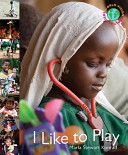
A celebration of the common love of play shared by children throughout the world is a lavishly photographed visual essay depicting young people from a diverse range of cultures engaged in activities from games and dancing to pretending and cuddling.

A celebration of the common love of play shared by children throughout the world is a lavishly photographed visual essay depicting young people from a diverse range of cultures engaged in activities from games and dancing to pretending and cuddling.
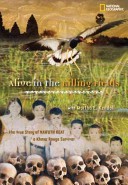
Alive in the Killing Fields is the real-life memoir of Nawuth Keat, a man who survived the horrors of war-torn Cambodia. He has now broken a longtime silence in the hope that telling the truth about what happened to his people and his country will spare future generations from similar tragedy. In this memoir, a young Nawuth defies the odds and survives the invasion of his homeland by the Khmer Rouge. Under the brutal reign of the dictator Pol Pot, he loses his parents, young sister and other members of his family. After his hometown of Salatrave was overrun, Nawuth and his remaining relatives are eventually captured and enslaved by Khmer Rouge fighters. They endure physical abuse, hunger and inhumane living conditions. But through it all, their sense of family holds them together, giving them the strength to persevere through a time when any assertion of identity is punishable by death. Nawuth’s story of survival and escape from the Killing Fields of Cambodia is also a message of hope; an inspiration to children whose worlds have been darkened by hardship and separation from loved ones. This story provides a timeless lesson in the value of human dignity and freedom for readers of all ages.
Tash’s parents die and she must learn to take care of herself.
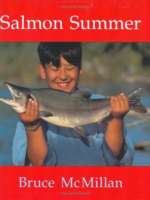
A photo essay describing a young native Alaskan boy fishing for salmon on Kodiak Island as his ancestors have done for generations.
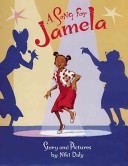
The summer holidays are here and Jamela is bored as a girl can be! All she can think about is the Afro-Idols TV final, so when she lands a job at Divine Braids hair salon, she can’t believe her eyes when Afro-Idols celebrity Miss Bambi Chaka Chaka arrives at the salon to be coiffed. But while Jamela’s idol dozes and Aunt Beauty designs her starry hairdo, a buzzy fly appears on the scene and threatens to ruin everything.
See the review at WOW Review, Volume 5, Issue 3.
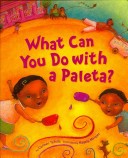
A young Mexican American girl celebrates the paleta, an icy fruit popsicle, and the many roles it plays in her lively barrio.
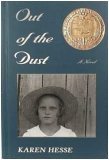
In a series of poems, fifteen-year-old Billie Jo relates the hardships of living on her family’s wheat farm in Oklahoma during the dust bowl years of the Depression.
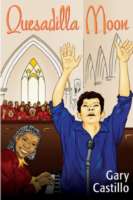
As a young migrant worker, David is shocked and thrilled when the man running the field store offers him a loaf of bread in exchange for a song. Singing has been strongly discouraged by David’s father, who views it as a less-than-manly activity. But the opportunity to get food for free is a temptation David can’t resist, and the praise he receives afterwards produces a sense of euphoria he has never felt. Someone is actually paying him to sing! But singing always leads to conflict with his father, and the only time David can do it without getting into trouble is when the others start to harmonize to pass the time as they move up and down the rows, picking cotton, asparagus, or other crops. To help get through the grueling labor, David regularly daydreams about performing in front of an adoring audience. As David and his family move from town to town following the crops, he begins to forget his dream of becoming a singer, until one day when he learns about a local competition. Somehow, his feet carry him to the Four Square Apostolic Church where the contest will take place, but he is shaken when the elderly black ladies setting up for the event tell him it’s only for “colored folk.” When he is ultimately given the chance to participate, he eagerly seizes the opportunity. Is it really possible that his dreams might come true? Will the people who believe in him–a group of African-American women and an ambitious young reporter from the Oakland Tribune–be able to help David overcome the racial, social, and familial barriers he faces?
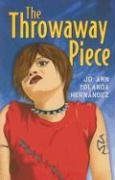 Jewel is shuttled from one foster home to another. But Jewel wasn’t always a “State Kid.” Her mother Angela’s constant search for happiness through a steady stream of unsavory boyfriends leads to the state’s intervention in Jewel’s life. Listening to her new foster mother’s list of “nos”—no drugs, no lying, no stealing, no skipping school, no boys in or out of the house, no being late—Jewel realizes that her mother said “yes” a lot. Probably too much. She remembers saving Angela’s life when one of many boyfriends beat her, trying to hide another boyfriend’s attempts to rape her when she was fourteen, and being sent to a foster home to please the latest boyfriend. But still, Jewel worries about her mother and knows that she will once again pick up the pieces when the latest jerk leaves. Bit by bit Jewel’s life begins to change for the better after her latest move to a new foster home and school. Although most people can’t see past her tough “State Kid” façade—spray-painted hair, heavy make-up, ripped clothing and unlaced shoes—her English teacher realizes there’s more to her then meets the eye. He convinces Jewel to tutor a fellow student who needs help with math, and gradually she learns how to make friends. In the process, she touches the lives of many people around her, including her social worker, teachers who believe in her, her new-found, tentative friends, and even their parents. But when she’s forced to choose between her life-long job—taking care of her mother”—and doing what’s right for herself, old habits and loyalties are hard to break. Jewel is sure that this time, she can save her mom. But will she be able to save herself?
Jewel is shuttled from one foster home to another. But Jewel wasn’t always a “State Kid.” Her mother Angela’s constant search for happiness through a steady stream of unsavory boyfriends leads to the state’s intervention in Jewel’s life. Listening to her new foster mother’s list of “nos”—no drugs, no lying, no stealing, no skipping school, no boys in or out of the house, no being late—Jewel realizes that her mother said “yes” a lot. Probably too much. She remembers saving Angela’s life when one of many boyfriends beat her, trying to hide another boyfriend’s attempts to rape her when she was fourteen, and being sent to a foster home to please the latest boyfriend. But still, Jewel worries about her mother and knows that she will once again pick up the pieces when the latest jerk leaves. Bit by bit Jewel’s life begins to change for the better after her latest move to a new foster home and school. Although most people can’t see past her tough “State Kid” façade—spray-painted hair, heavy make-up, ripped clothing and unlaced shoes—her English teacher realizes there’s more to her then meets the eye. He convinces Jewel to tutor a fellow student who needs help with math, and gradually she learns how to make friends. In the process, she touches the lives of many people around her, including her social worker, teachers who believe in her, her new-found, tentative friends, and even their parents. But when she’s forced to choose between her life-long job—taking care of her mother”—and doing what’s right for herself, old habits and loyalties are hard to break. Jewel is sure that this time, she can save her mom. But will she be able to save herself?